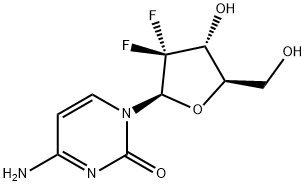Gemcitabine (2’,2’-difluorodeoxycytidine; dFdCyd) is a novel deoxycytidine analogue with both structural and metabolic similarities to cytarabine. It has a broad spectrum of antitumor activity in preclinical murine leukemia and solid tumor models. This drug requires intracellular phosphorylation that results in the accumulation of difluorodeoxycytidine triphosphate (dFdCTP). The dFdCTP competes with deoxycytidine triphosphate (dCTP) for incorporation into DNA, which in turn inhibits DNA synthesis and terminates DNA chain elongation. In addition, this drug reduces intracellular deoxynucleoside triphosphate pools, presumably through the inhibition of ribonucleotide reductase.
Gemcitabine is used alone or with other treatments/medications to treat certain types of cancer (including breast cancer, non-small cell lung cancer, ovarian cancer, pancreatic cancer, bladder cancer, bone cancer, Ewing’s sarcoma, mesenchymal chondrosarcoma osteosarcoma, dedifferentiated chondrosarcoma, head and neck cancers-cancer of the nasopharynx, hepatobiliary cancers including gallbladder cancer, Hodgkin lymphoma, kidney cancer, malignant pleural mesothelioma, non Hodgkin lymphoma, non-melanoma skin cancer – dermatofibrosarcoma protuberans (DFSP), occult primary, small cell lung cancer, soft tissue sarcoma, testicular cancer, thymic malignancies, uterine malignancies). It is a chemotherapy drug that works by slowing or stopping the growth of cancer cells. One commercial product of gemcitabine is Gemzar, which is supplied in a sterile form for intravenous use only.

